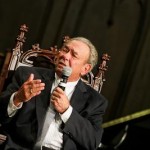2016
More than ten years ago, Al Mohler wrote a seminal blog post outlining what he called “theological triage.” Borrowing the term from the emergency room, Mohler discussed the need for Christians to prioritize certain doctrinal issues over others.
In what can be the chaos of an emergency room, medical professionals need to know how to weigh the urgency of various patients’ needs against one another; that is, a gunshot wound should be prioritized over a sprained ankle. Similarly, in the theological world, Christians must understand the difference between (a) “first-order” doctrines—where to hold an errant position actually precludes one from being a true brother in Christ—and (b) “second-” and “third-order” doctrines—issues on which two genuine Christians can disagree and nevertheless be truly saved. In other words, we need to be able to discern the difference between erroneous teaching (on non-fundamental issues) and heresy.
All biblical doctrine is important. I would go so far as to say all biblical doctrine is essential. It is difficult to put any doctrine into a second or third tier, because it somehow feels as if to do so is to say it’s not important. But employing theological triage doesn’t mean that everything that’s not first-order is unimportant, any more than a doctor’s prioritizing a gunshot wound necessarily thinks a sprained ankle is unimportant. But the fact remains: genuine Christians can disagree on things like the mode and recipients of baptism; but if two people disagree on the triunity of God, one is a Christian and the other isn’t.
The Reality of Damning Error
Some people reject the very notion that disagreements about doctrine could preclude someone from salvation. After all, no one has perfect theology, and we’re saved by believing in Christ, not by believing in doctrine, they say. And it’s true, regeneration does not promise protection from all error. But it does promise protection from some error—that is, the kind of error which, if believed, indicates you’re not a child of God at all. We know that that kind of theological error exists because the Apostle Paul wrote Galatians 1:6–9:
I am amazed that you are so quickly deserting Him who called you by the grace of Christ, for a different gospel; 7which is really not another; only there are some who are disturbing you and want to distort the gospel of Christ. 8 But even if we, or an angel from heaven, should preach to you a gospel contrary to what we have preached to you, he is to be accursed! 9As we have said before, so I say again now, if any man is preaching to you a gospel contrary to what you received, he is to be accursed!
Paul wrote that about the error of the Judaizers, which, if you think about it, by some evaluations was quite a fine point of doctrinal disagreement. Think about everything the Judaizers shared in common with the faith once-for-all delivered to the saints. They believed in one God, who exists eternally in three Persons: the Father, Son, and Holy Spirit. They believed in the deity and humanity of Christ. They believed that He was Israel’s Messiah in fulfillment of the Old Testament. They believed in penal substitutionary atonement—that Christ bore the punishment of God’s wrath against the sins of His people when He died on the cross, so that they might be free from sin’s penalty and power (and one day its presence). They believed that He was buried, and that He rose on the third day. And they believed that repentance and faith in Christ was absolutely necessary for forgiveness of sins and fellowship with God in heaven. That is a lot of really important doctrine that they got right! Continue reading

